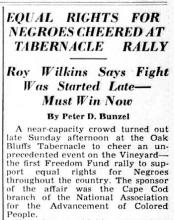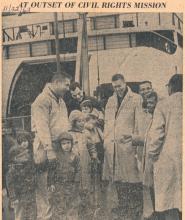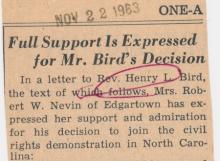The following Statement of Interpretation was given at Grace Church, Vineyard Haven, on Sunday morning, by the Rev. D. Norman Brady of Falmouth. Mr. Brady was supplying at the service of morning prayer in the absence of the Rev. Henry L. Bird, rector. The statement:
“Whether we like it or not these days, we are all involved in a number of changing patterns in our society. You and I are involved in the recent events happening in Williamston, N. C. You are involved because your rector, out of conscience, has gone there to express tangibly his concern for one manifestation of segregation - a serious problem throughout the land.
“He is there as a member of your parish family, and not I am sure, in any sense as the leader of your family. For I know Henry Bird well enough to know that he is consistent in his thinking and actions, to the extent that he would not presume to allow his way of responding to our national crisis as necessarily suggesting the way in which any of the rest of you ought to act. But as a member of this parish family, as an individual Christian, he requires us to give deep thought to what our role shall be.
100 Years of Fence-Sitting
“No one can fail to form some opinion, some attitude borne out of reason and Christian love. Indeed, 100 years of fence-sitting is why we suffer this national disgrace of inequality before the law. You must decide. That is what makes it legitimate for a person from one part of the country to go to another part and demonstrate, if that is what he feels he must do.
“Some of us genuinely do not feel this to be the appropriate means of putting our own concern into action. And the person who is nevertheless concerned should not suffer any guilt or accusations for not having expressed his concern in some particular way - in this case, by demonstrating. Each person’s response will have to be the one that is valid for him, so long as there is a response.
“But let us be happy to have the seemingly most dramatic of all responses: public demonstration. Archbishop William Temple used to say that while he could not be a pacifist himself, he was grateful that there were those who were pacifists, making it inescapably necessary for everyone to lay to heart the deep implications of man’s inhumanity to man.
“Out of deep respect and admiration for your rector, I commend him to your prayers, and understanding love. May you and he be the richer for his having gone to North Carolina.”










Comments